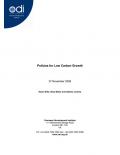This paper discusses some of the challenges and opportunities in infrastructure investment in developing countries. Infrastructure investment in emerging and developing countries will need to more than double over the next decade. This means a significant step-up in the amount of public and private finance flowing to these countries. Such investment will be crucial not only to ensure that emerging and developing countries meet their growth and development aspirations, but also to ensure that they lay the foundations for sustainable growth, which entails low emissions and resilience to climate change.
A new Development Bank for Infrastructure and Sustainable Development could provide a new channel through which developing country governments could borrow to finance economically productive infrastructure assets - whilst still remaining within prudent levels of debt. In addition, a new institution could make up for the deficiencies of the existing architecture and help catalyze the private sector investments required.
This paper focuses on how developing countries can change the way they prepare for disasters so they are better equipped to sustain economic growth. It discusses the importance of considering the goals of key decision makers and the need to understand the perceptions, systematics biases, and heuristics used by the relevant interested parties (the affected public, private and public sector organizations, and nongovernmental organizations) in choosing between alternatives. The paper highlights the importance of undertaking benefit-cost analysis to evaluate disaster risk reduction measures, recognizing that decision makers might not make meaningful use of this policy tool given their behavioral biases and simplified heuristics. To address these issues, the authors propose green growth strategies that involve multi-year contracts coupled with short-term incentives that have a chance of being implemented. The strategies focus on the role of multi-year micro-insurance, long-term loans, and multi-year catastrophe bonds that reflect the institutional arrangements in the developing country.
This report is part of the United Nations Development Programme’s Global Environment Facility’s (UNDP-GEF) efforts to codify and share lessons learnt from how scarce public resources can be used to catalyse larger private financial flows for renewable energy. It provides an overview of UNDP-GEF projects in 14 developing countries which are supporting the development of national renewable energy policies based around feed-in tariffs and related instruments. In these activities UNDP-GEF assists developing countries to assess key risks and barriers to technology diffusion and then to identify a mix of policy and financial de-risking measures to remove these barriers and drive investment. This approach is illustrated through three case studies in Uruguay, Mauritius and Kazakhstan. The report finds that a key challenge for policy makers is to create the conditions to make renewable energy attractive to investors and utilities without jeopardising the attainment of other development goals.
This summary was prepared by Eldis.


